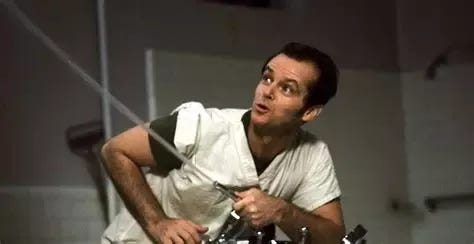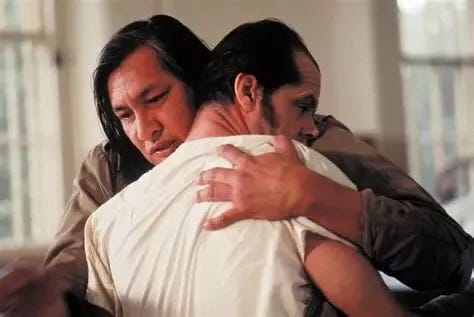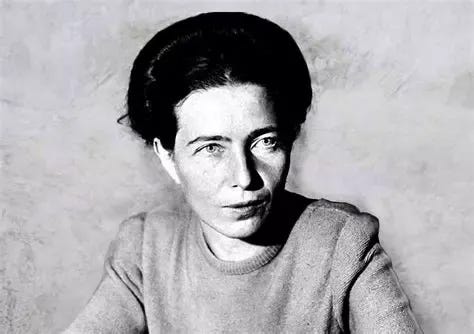“Our society tends to regard as a sickness any mode of thought or behavior that is inconvenient for the system and this is plausible because when an individual doesn't fit into the system it causes pain to the individual as well as problems for the system. Thus the manipulation of an individual to adjust him to the system is seen as a cure for a sickness and therefore as good.”
—Theodore Kaczynski
When a madman who’s idea for saving the world involved murdering individuals that were a part of the same industrial revolution he saw as inherently self destructive starts sounding substantially more rational than the supposed “experts” who claim they are there to “help,” those who suffer from what is deemed as a form of mental dysfunction, then that’s when it’s made all the more clear of just how irrationally constructed a system is along with the manner in which we frame it in comparison to an individual who strays away from what is considered the traditional norm. This projection is based solely on the appearance that it is functioning, which is in stark contrast to an individual who was deemed unfit, mentally ill, or dysfunctional, as if the many levers of that system itself weren’t already tumbling down and falling at the kind of pace that makes a stack of dominos look tame and natural. If there’s anything Milos Foreman’s One Flew Over The Cuckoo’s Nest presents, it is the question of sanity and the absurdity of legitimizing it in favor of a society that can only wear its mask for so long before it’s own contradictions bring about its unraveling.
One Flew Over The Cuckoo’s Nest is many things. On one level, it’s a comedy that probably wouldn’t have worked as well without the wily antics of someone as prolifically hilarious as Jack Nicholson. On other levels, it’s a drama about how a man who isn’t really crazy manages to recognize and cherish the humanity in a group of mental patients. But a key take away from the film, is the way it frames the idea of mental illness and what it ultimately means to be a civilized human being in relation to a sanity that abides by many standard principles that hardly constitute anything remotely empathetic or sane for that matter.
The mental hospital portrayed in One Flew Over The Cuckoo’s Nest is depicted in a very formal, almost managerial fashion by the equally professional Nurse Ratched (Louise Fletcher), who on the surface carries a very corporatized professionalism that only few people with decent poker faces can carry without leaking the shit that fills their essence in their ability to appear as a human being rather than the hollow void that their career identity constitutes. As the narrative progresses, and the interactions, or the ways in which she manages patients are made clear, then does her more authoritarian nature become that much more visible, especially from the introduction of Randall McMurphy, (Jack Nicolson) who is sent as part of an evaluation process as a result of a statutory rape charge, along with a record of past incidents characterizing his refusal to abide by authority or his inability to remain still.
The first impression of McMurphy jumping in victorious joy at the revelation that he’s been sent to a mental institution rather than a prison is that he’s a two bit hustler looking for an easy ride. There is some truth to that as it is demonstrated by the charismatically devilish demeanor that only Jack Nicholson’s performance could convey through his ability to smooth talk himself out of any suspicion that he is faking the very insanity a society will assign to him simply because he doesn’t fit the standards it has judged as efficient to its own function.
As a character, McMurphy is many things, he’s devilishly funny, charismatic, and empathetic in the sense that despite his animalistic and untamable persona, he still carries a greater embodiment of the humanity that a mental hospital and its authoritarian staff lack throughout the majority of the story. Nurse Ratched on the other hand, is as big brother as movie characters can be without making any bull horn attempts of advertising themselves as the big bad movie fascist a lot of other great film characters play with. If anything, the tender and somewhat motherly demeanor she depicts when talking to the patients she feigns empathy for, when really all she is after is control, carries a more disturbing quality in how more inherently robotic it reveals itself as being in comparison to something that borders on a more human quality. Professional and direct in her character, Nurse Ratched maintains a sense of control over the group of mental patients under her care with an effortlessness that further show cases the amount of power she holds over them and whatever manner of personal expression they feel that they are allotted.
McMurphy on the other hand challenges Ratched’s authoritarian dominance through his rebellious and even animalistic individuality, which is something she and the mental institution she works for seek to eradicate, while claiming him to be dangerous, even when the interactions he has with other patients, chaotic and as messy as they can be at times, still succeed in inspiring significant if not greater measures of self-confidence and more genuine empathy because out of the authenticity that they carry. It is this same level of authenticity that serves as a point of clarifying the lack of empathy many elements in the mental health industry lack. At the same time though, it isn’t a volatile indictment of the entire mental health sector given that there are clearly people who work in the field who sincerely care about helping people who do struggle with their psychological problems. However, when a goofy wildcard like McMurphy recognizes the humanity of the very patients that have convinced themselves that they are less functional than the emotionally desensitized employees of a mental hospital who treat patients more like live stock rather than actual people, then that only raises the question of what constitutes sanity when factoring humanity.
The idea and multi-layered question of sanity comes to full force at the climatic conclusion of One Flew Over The Cuckoo’s Nest as a result of the tragic suicide of one of the film’s more endearing characters Billy Bibbit (Brad Douriff). Although initially framed as an endearingly boyish character with somewhat of a comedic angle, the more serious elements on Billy’s character revolve around his extreme speech impediment, which although can come off as funny in some moments, the more intense moments are depicted whenever he is being forced into more toxic verbal exchanges with Nurse Ratched, who despite approaching him with her performative motherly demeanor, still pushes beyond his tolerance point with zero empathy in the amount of discomfort it brings upon him in discussing his past traumas, which include his first suicide attempt, and his failed romances.
The full spectrum of Ratched’s cold nature is further captured at the conclusion of the film once Billy and what little confidence McMurphy gave him is broken down and reverted back to his nervous stuttering, all because the threat of his mother finding out about his behavior had been introduced. Ratched’s reaction to his suicide is completely devoid of any compassion, so much so that it forces McMurphy—the supposedly dangerous patient—to strangle her. As tragic as that part of One Flew Over The Cuckoo’s Nest is, the even greater tragedy of the film is showcased by the demise of McMurphy, who after his assault on Ratched is lobotomized and left as a hollow void of the liberated free spirit that breathed life into the patients of the Salem State Hospital.
The manner in which One Flew Over The Cuckoo’s Nest handles the subject of sanity is an intriguing one given that sanity is often used to characterize the idealized state of mental health for an individual. However, a more introspective look at the idea of sanity will have one learn that it is more delegated to the legal association within the court system. A prime example of this involves the case of Jeffrey Dahmer.
For those unfamiliar, which would be less common nowadays, Jeffrey Dahmer was a serial killer who from 1978 to 1991 murdered, decapitated, cannabalized, and even had sex with the heads of his black teenage male victims. The gruesome brutality of these murders spared nothing short of painting Dahmer as a monster, who was diagnosed with borderline personality disorder (BPD), schizotypal personality disorder (StPD), and a psychotic disorder. However, in spite of these multiple diagnosis’s and the violent murders they were attributed to, Dahmer was found to be legally sane at his trial. Now upon first hearing that, the only rational response of “what the fuck” seems like the only adequate way of processing what can only be described as sheer lunacy. If a cannibal necrophiliac can be deemed legally sane while a rebellious mental patient who simply strangles the hell out of a robotic monster who shows less than basic human sympathy at the suicide of a young man who happens to be the child of her dear friend, then the idea of sanity is the reason we should all be losing our shit and laughing our asses off to the same degree McMurphy refuses to hold himself back whenever even a hint of bullshit appears before him.
A revelation such as the one concerning the case of a violent killer like Jeffrey Dahmer only illustrates how it would be more rational to laugh and dismiss the idea of sanity given how even someone as depraved in the vices that define a man who embraces them as he did can still be declared sane. A man like Dahmer is evil, but the fact that his engagement in acts as deprived as necrophilia and cannibalism can still have him considered a sane person in a society that doesn’t normally engage in such behaviors is beyond bizarre if not outright moronic under the false modicum of a civility it tries to depict. This is diametrically opposed to the scene where it is made evident that aside from McMurphy, most of the patients in his ward, aside from Chief (William Sampson) are all voluntary, and yet they have convinced themselves that they all need help in treating mental problems that all though important from a health perspective, hardly seem critical or even a danger to society, which is another topic of discussion posed within One Flew Over The Cuckoo’s Nest.
“Society cares for the individual only so far as he is profitable.”
Simone de Beauvoir
McMurphy’s introduction never shies away from not only detailing the mental/personality defects that have brought him to the Salem State Hospital, but it also showcases how his reluctance to abide by traditional authoritative structures has hurt him whenever he was employed, and this relates more to a statement the comedian Duncan Trussell made on the Joe Rogan Experience when dissecting McMurphy from the Kensey novel that this film is adapted from.
Trussell interpreted Randal as an “undomesticated human,” which really is a way of saying that in addition to not fitting into society, that concept of a human being and the element of domestication in of itself illustrate something relative about the human being’s relationship to society. As human beings, we tend to either forget or outright deny our more primal/violent origins. As descendants of Chimpanzees, our wild and violent nature is something we’ve strived to conquer, and for the most part, we have done that to an extent that has allowed for us to establish a civilization that operates under a sense of structural order that preserves our cooperative survival. However, as a society, particularly a post-industrial society that depends on a capitalistic framework, that has emerged and grown to ungodly proportions, then so has the need for the growth of a production rate that demands more work and cooperation from the individuals making up that very process. If an individual so much as strays or proves to become uncooperatively unfit for what such a system entails, they are then treated as if they are a mistake that needs to be corrected or an abomination requiring even more drastic measures. Not once is the structure of the system ever questioned or looked upon as the problem, it is always the dissident, just ask Noam Chomsky.
One Flew Over The Cuckoo’s Nest’s examination of the mental health industry is explored through such topics like the use of pharmaceutical medication, electro shock therapy, and the inhumane transorbital lobotomy, which going outside the medical aspects that characterize it’s surgical nature, the more ethical notions of changing a person’s nature against there will is already immoral in of itself, and the end result of McMurphy being a hollow and vegetable-like shell of the free spirit the film made us fall in love with is a tragic site to see, and one that is remedied through the kind of act of murder for the sake of mercy.
It would be foolish to say that there isn’t something sad and even painful in watching Chief find a man he was able to relate to in his own desire for freedom ruined and left a hollow shell of his former self. However, his refusal to leave him in such a decrypt and miserable state would’ve been just as cruel and an even greater betrayal than the one Billy made prior to his suicide.
A first impression look of One Flew Over The Cuckoo’s will present it as a comedic film centering on a rabble rosing troublemaker starting shit in a mental institution. But with a more critical overview, the examination it gives on the normalization of some of the unethical practices enacted in the mental health industry, shows that there is a greater complexity to the diverse nature of human beings and how simplifying them into labels or categories that pertain to the function of a particular societal/economic structure can be detrimental not only to their sense of character, but also to our own ability to truly look at ourselves with a humble sense of perspective, which is denied to many of the patients within the film whenever they are being honest about their past traumas, and rather than being empathetic, figures like Nurse Ratched pick at these traumas as a means of finding fault within the person rather than postulating the larger picture at hand. This analytical framework all goes back to the societal landscape that breeds the sort of mental illness that is treated as though it can be either rehabilitated or permanently cured as if it were a quick fix. It’s basically a way of mitigating the symptom rather than looking more closely at the central cause of such a problem.
“Whether we realize it or not, it is our woundedness, or how we cope with it, that dictates much of our behavior, shapes our social habits, and informs our ways of thinking about the world.”
― Gabor Maté
Mate has also quoted the Buddha and how through our minds we create the world, while also going about in a vice versa manner that showcases the nature of how the world is essentially that of a construct that carries no truly objective solution. A case could be made for the structural approach that the medical industry makes in tackling the complexly diverse nature of mental health. However, because much of how mental health is viewed solely through the lens of domesticating individuals to fit more in line with the system that cannot tolerate their abnormal behavior, as opposed to pinpointing a lens towards itself, it never goes far in attempting to understanding the reason for such abnormal behaviors.
In his criticism of capitalism, Mate spoke about how it creates the means for greater mental/physical illness. He detailed how it’s sole drive is for the purpose of profit, and this direct pursuit has often involved the exercise of an authority over people’s lives that denies them the kind of autonomy that would allow them a healthy manner of reflecting and exploring their trauma. This form of denial only breeds greater if not more harmful forms of anxiety and disconnection from one another. Although One Flew Over The Cuckoo’s Nest doesn’t delve into that level of complexity, it still manages to explore a dual dynamic of the authentic humanity characters like McMurphy carry in their diametric opposition to the mechanized behavior figures like Ratched and the institution she represents stand for, and how their ultimate intention isn’t really on the mental well-being of the person they are treating so much as the appearance a mentally well person projects through a form of domestication that validates the sort inhumane practices they use to achieve such a goal and all for the sake of a system that isn’t interested in understanding the suffering it causes but instead the continual suppression of it.
“The attempt to escape from pain, is what creates more pain.”
― Gabor Maté
If You wish to support me and the work I do, then feel free to donate what you can. Even a dollar restores my faith in humanity.
Bitcoin
bc1qpyy3galr2z4wrm62t95dzme9kp9h00vje2gu6j
Monero
895uYBwiez7HQwawSyYtcwcNUqhugWXcAMaMgsTktgkoSyMQkKjjEU2duri5GfCi7AUSLHWyhSF76eRws5dfQGWZ42iyPSq
https://www.paypal.me/Vincentmurdock666
Affiliates
CashApp:
https://cash.app/$AndresIBenatar
https://cash.app/refer/P2DWNDH
ProtonVPN
https://pr.tn/ref/E8CMM7ETZZ9G
Swan Bitcoin
https://www.swanbitcoin.com/ViciousTheDevil
Fetch
https://referral.fetch.com/vvv3/referralsocial?code=3E1F4Y
Strike
https://invite.strike.me/IXEWYK
Ag1











